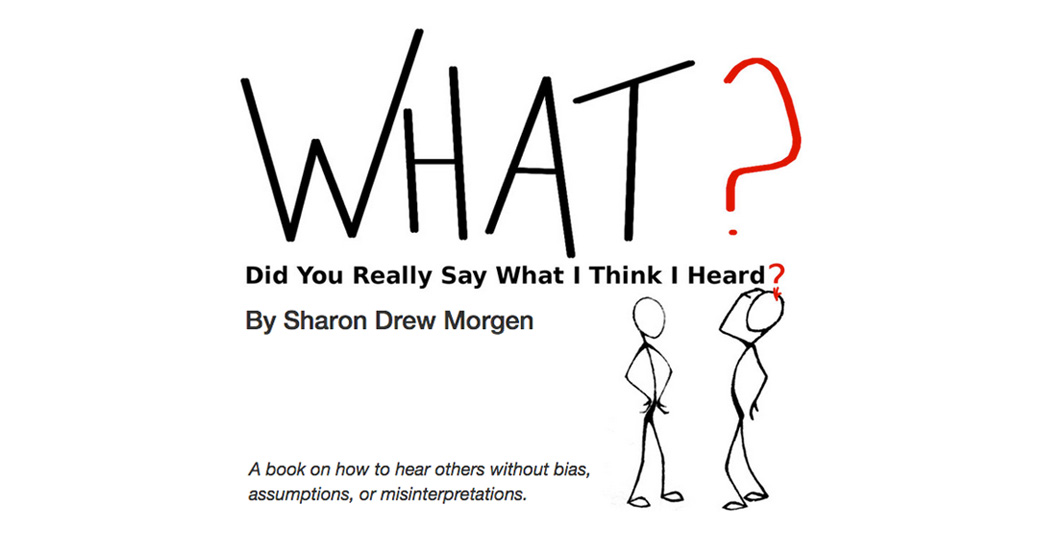Diversity And Bias: How to Hear ‘Different’ People Differently
We all recognize diversity is important yet difficult to attain. We recognize that with diversity we’re capable of creating all that’s possible; without diversity we limit who gets heard, who gets to lead, what knowledge we deem important, what we teach our children. Indeed, mis- and underrepresenting categories of people cost an unimaginable price in money, possibilities, and life.
People much smarter than I have evaluated the high cost of the lack of diversity. But I’d like to offer a modest way to begin the process of overriding our biases: we can shift how we listen.
BIASES ARE SILENT, STEALTHY EXECUTIONERS
While researching my new book (What? Did you really say what I think I heard?) I learned that the listening process involves 1. our ears collecting and funneling the sounds of words spoken, then 2. our brain (using our unique, cultural, and historic beliefs, values, rules, etc.) interprets meaning from the sounds.
Biases and assumptions occur when our brain notices ‘differences’ it deems ‘unsafe’ (judged against our status quo), causing automatic prejudice outside conscious awareness. I heard Malcom Gladwell, the noted author of Blink say in an interview that when tested for unconscious racial bias, his results revealed something like a 53% bias against African-Americans – and he’s half black. We end up living and thinking in bubbles of our own making. The ideas, the capability, the innovation that gets lost is unimaginable.
At a dinner party once a man at my table discussed what I knew to be a naïve idea in my area of expertise. I ‘kindly’ explained to him the error of his ways. He merely smiled. Afterwards I learned that I had been admonishing a Nobel Laureate (in a different field than mine). Had I known that, I might have listened to his ideas as merely different or even interesting. Ditto if he knew I was a noted expert on the topic. Maybe together we could have changed the world in a unique and wonderful way. Instead, we listened to the other with biased, judging, ego-filled ears. What would we each have needed to believe differently to be able to hear each other without restriction?
On another occasion my biases potentially kept the world from glorious music. Visiting an ill friend at a nursing home recently I chatted with the orderly on staff. Whatever he heard me say motivated him to ask me to mentor him. I’m embarrassed to admit I declined. Thankfully he persisted. I went to his place for a lovely dinner, serenaded by a CD of his wonderous compositions! I coached him going forward, to find funding to make his music available to the public. But I almost missed that opportunity because I immediately judged him negatively.
LISTEN WITHOUT BIAS
Realizing a part of the problem in judging others as ‘different’ lies with how we interpret what we hear, we can take steps to recognize when we are judging, biasing, or assuming, and then supersede our brain’s natural tendencies and listen neutrally:
- Enter conversations with a bias of listening for all that’s possible.
- Notice when we begin hearing differences or an internal judgment, and return to concentrating on what’s really being meant.
- When our internal voice begins judging, reducing, disparaging, or condemning, pose the question to your internal self: what would I hear if I only heard what this person wants to share with me?
It’s not easy, as our brains are neurologically designed to hear what keeps us comfortable. But if we can at least aspire to hearing what others have to share, we can be further along the path of diversity and avoiding limitations.
I’ve actually developed tools for those who wish to have choice to listen neutrally – without bias, assumptions, or triggers. First read What? Did you really say what I think I heard? to reduce barriers to entry. Then go to the Learning Tools on www.didihearyou.com and get the Assessment Tool and Study Guide to begin recognizing your biases and how to listen without filters. Or contact me, and we can discuss ways your team can gain new skills for meetings, implementations, sales, HR, or diversity training. It’s time, folks. We need to hear the uniqueness of everyone. sharondrew@sharondrewmorgen.com.
Sharon Drew Morgen February 2nd, 2015
Posted In: Listening

